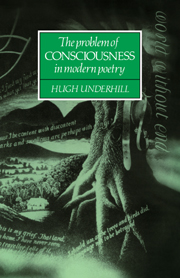Book contents
- Frontmatter
- Contents
- Preface
- Introduction: the inward revolution
- 1 From Georgian origins to ‘Romantic primitivism’: D. H. Lawrence and Robert Graves
- 2 Strangers to nature: modern nature poetry and the rural myth
- 3 The ‘poetical character’ of Edward Thomas
- 4 ‘Myself must I remake’: W. B. Yeats
- 5 ‘Here and now cease to matter’: T. S. Eliot
- 6 The work of Man: Louis MacNeice and W. H. Auden
- 7 ‘Nothing of our light’: Ted Hughes
- Conclusion
- Notes
- Select bibliography
- Index
1 - From Georgian origins to ‘Romantic primitivism’: D. H. Lawrence and Robert Graves
Published online by Cambridge University Press: 18 December 2009
- Frontmatter
- Contents
- Preface
- Introduction: the inward revolution
- 1 From Georgian origins to ‘Romantic primitivism’: D. H. Lawrence and Robert Graves
- 2 Strangers to nature: modern nature poetry and the rural myth
- 3 The ‘poetical character’ of Edward Thomas
- 4 ‘Myself must I remake’: W. B. Yeats
- 5 ‘Here and now cease to matter’: T. S. Eliot
- 6 The work of Man: Louis MacNeice and W. H. Auden
- 7 ‘Nothing of our light’: Ted Hughes
- Conclusion
- Notes
- Select bibliography
- Index
Summary
Critics have long been anxious to keep good poets uncontaminated by the term ‘Georgian’. There are grounds for this, as I shall touch on later, but Georgianism was not only one thing. C. K. Stead noted that ‘a chorus of critics begins its remarks on D. H. Lawrence's poetry by saying that he was “not a Georgian”’, then added:
In so far as all poets are individuals, no poet is a Georgian – or a Metaphysical either. But the characteristics which mark off the Georgians from their immediate predecessors are shared by Lawrence, Graves, Owen and Sassoon: a rejection of large themes and of the language of rhetoric that accompanied them in the nineteenth century; and an attempt to come to terms with immediate experience, sensuous or imaginative, in a language close to common speech.
‘Immediate experience’, ‘a language close to common speech’ – these phrases denote key ideas and I will return to them. Pound's Imagists may soon have looked more innovative, but the Georgians were just as clearly ‘marked off from their immediate predecessors’.
In the beginning they seemed dramatically so, to their editor – ‘this volume is issued in the belief that English poetry is now once again putting on a new strength and beauty’ – and to the public and reviewers, notably Lawrence himself in an article on ‘The Georgian Renaissance’: ‘But we are awake again, our lungs are full of new air, our eyes of morning.
- Type
- Chapter
- Information
- The Problem of Consciousness in Modern Poetry , pp. 21 - 64Publisher: Cambridge University PressPrint publication year: 1992



